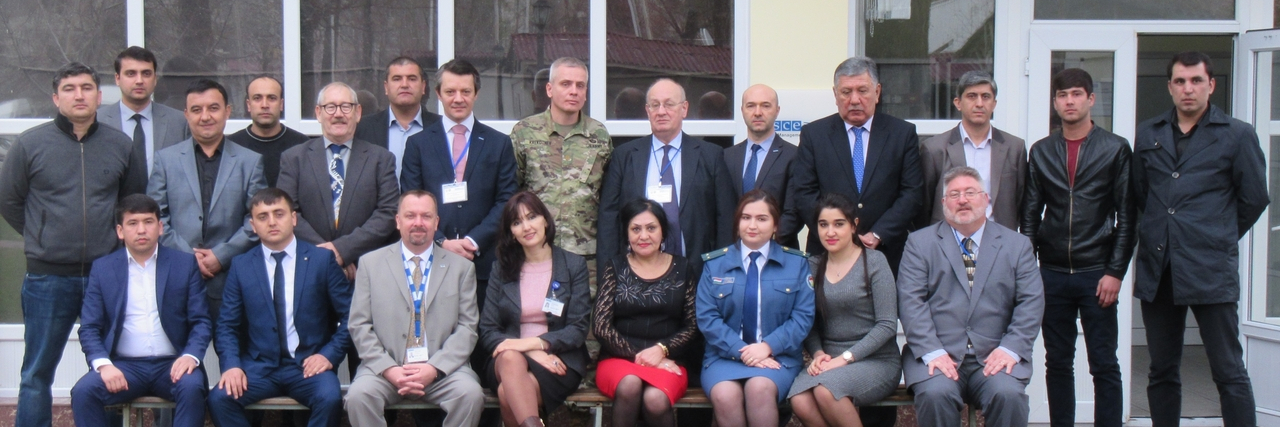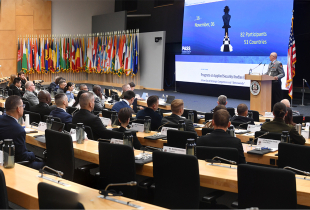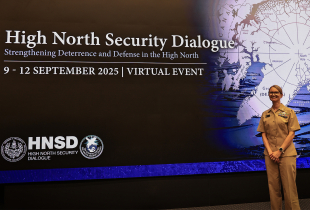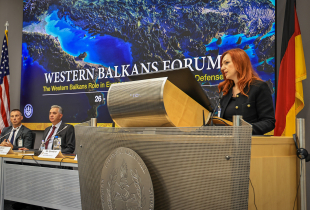
Marshall Center’s Central Asia Program Hosts Border Security, Management Workshop in Tajikistan
By Andrew Brinkman
Central Asia Team
George C. Marshall European Center for Security Studies
DUSHANBE, Tajikistan (March 16, 2018) – The Marshall Center’s Central Asia Non-Resident Program, Organization for Security and Co-operation in Europe (OSCE) Dushanbe’s Border Management Staff College, and the U.S. Embassy Dushanbe, conducted a workshop on Border Security and Management here March 13 and 14.
This workshop brought together a group of nine international experts from the European Union, the United States, Kazakhstan, and Tajikistan to share their experience with employees, planners and officials of the Government of Tajikistan.
The aim of the workshop was to enhance Tajikistan’s capability to effectively manage its borders, disrupting illicit trafficking and terrorist threats, while also allowing for the growth and development of commerce.
The workshop focused on inter-ministerial, as well as interregional, cooperation measures that could be enacted to more effectively counter transnational threats.
U.S. Army Maj. Max Krekotnev, chief of the Office of Military Cooperation at the U.S. Embassy Dushanbe, Dr. Pal Dunay, academic advisor for Marshall Center’s Central Asia Program, and Jonathan Holland, director of the Border Management Staff College, opened the workshop and emphasized in their statements, the vital importance of border security and that a proactive approach among various ministries and agencies is necessary to protect the homeland of Tajikistan.
In the context of security cooperation, the Marshall Center working with the U.S. and the German Embassies throughout Central Asia have conducted an ongoing series of events to regularly address mutual transnational security challenges in Central Asia; enhancing border security benefits all nations.
The workshop served as a forum to address international and multi-stakeholder security concerns in the area of Border Security and Management. Participants from the Ministry of Defense, Ministry of Internal Affairs, Borders and Customs examined the current border security challenges, and discussed practical and pragmatic ways to improve regional and international cooperation to effectively counter transnational threats encountered at their borders.
U.S. Air Force Col. James Turner, director of the Marshall Center’s Central Asia Non-Resident Program at the Marshall Center said:
“This advanced workshop was very effective in addressing a myriad of issues,” said U.S. Air Force Col. James Turner, director of the Marshall Center’s Central Asia Non-Resident Program.
Expert-led discussions covered varied topics: The Role of Border Services related to Migration; Identifying Returning Radicals and Potential Terrorists; Identifying Criminals and Human Traffickers; Joining Regional Integration; The Eurasian Economic Union; Experience in Kyrgyzstan; and, Broad Border Security Issues in Central Asia.
“Exercises focused upon different scenarios, which stretched participants intellectually and encouraged them to face the possibility of change within their existing systems,” Turner said. “Some of these topics, which their neighbors have adapted in some cases, included entering customs unions, visa-free entry, returning fighters, counter-narcotics, and a civilian border force.”


